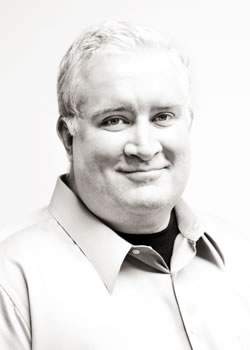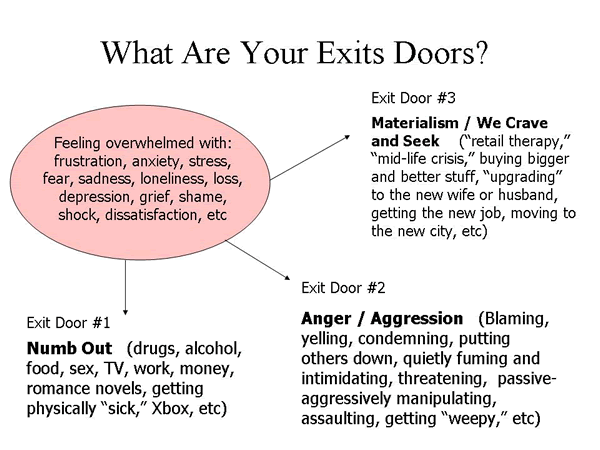
 Doctor Parker Wilson, Spiritual Advisor, Doctor of Clinical Psychology, and Director of The Awakened Mind Institute, Denver Psychotherapy Center
Doctor Parker Wilson, Spiritual Advisor, Doctor of Clinical Psychology, and Director of The Awakened Mind Institute, Denver Psychotherapy Center
The curious paradox is that when I accept myself just as I am, then I can change." Dr. Carl Rogers
Depression and anger often walk hand in hand in the sense that they frequently co-create each other.
So how does this actually look, this process of depression and anger co-creating each other? Just as a species, we tend to be a little uncomfortable with our emotions and mood states. Often we have developed an unhealthy relationship with our own emotions (sometimes because of abuse, trauma, neglect, crime, death, and other unfortunate circumstances), and we feel overwhelmed.
When we can not tolerate our own emotions and mood states, we begin to become perpetually and increasingly afraid and anxious. This just increases the sense of overwhelm that we had originally, and so now we really freak out, and we begin looking for the nearest exit door.
Sidebar: Please review AMI's fees for service. Therapy can be scheduled every week or every other week, depending on the circumstances of the particular clients. Schedule a consultation with Dr. Parker Wilson.
There are there basic exit doors that human beings use to create a temporary disconnection between themselves and their own afflictive emotions. These exit doors are: numbing out, anger and aggression, and materialism or "craving and seeking." The one most relevant to this article is the exit door of anger and aggression.

So, this is how it works (again, generally speaking). When we can no longer ignore our own afflictive emotions, when they again intrude upon us, then we begin to fight them. When fighting them (trying to force them to leave) only seems to make them stronger, then we begin to feel helpless. When we feel helpless, we become angry. Think about it. Anger feels powerful; in the moment, anger feels like the very opposite of helplessness.
For anger to sustain itself in our minds, someone or something has to be at fault for our suffering. Basically, to solidify or "concretize" the feeling of anger, we need to blame. Blame is the air that anger breathes, and so without blame, anger can and does suffocate and fall away. For some people, the primary object of blame is their own sense of self, but for most of us most of the time, we are content to blame another person, place, or thing.
To stay angry you must blame effectively, and to blame effectively, we must tell ourselves a story about our feeling (the story of why), and that story must star us as the victim of some misguided, or unjust person, place, or thing. The the more victimized we feel, the stronger the blame feels, and the worse the anger feels.
The trouble with using anger and blame as an exit door, then, is that the exit is only temporary and always produces long term negative side effects like depression. Anger and blame don't change anything, in fact they only make the mental situation worse. Blame disconnects us from our authentic experience of life; it disconnects us from everything that we are supposed to be feeling: loss, fear, helplessness, and grief. In this way, we stunt our own evolution and making our suffering worse.
Now things often accelerate. Once we have become angry and we have established our object of blame, now it becomes easy to get aggressive with our object. Now we can justify our own negative and aggressive beliefs, words, and behaviors with our sense of righteous indignation. But even with an object of blame, and a great victim narrative, we can not stay angry and aggressive for all that long.
Eventually we come crashing back down into the core emotional experiences that we were trying to exit in the first place: anxiety, fear, and helplessness. And what does the helplessness feel like once we crash back down into it? Now it is a little bit deeper and a bit more well established. That is the beginning of what will become a clinical depression.
Sidebar: Please review AMI's fees for service. Therapy can be scheduled every week or every other week, depending on the circumstances of the particular clients. Schedule a consultation with Dr. Parker Wilson.
This is how a more serious depression typically forms across weeks and months: entrenched and intense feelings of loss, fear, helplessness, and grief (fueled by the active cultivation of anger, blame, and aggression) that have never been properly acknowledged, worked with, and worked through.
When we habitually and compulsively exit our own experience of life, we cut ourselves off from the natural properties of the mind. We prevent the mind from resolving, evolving, and healing itself. No one can escape this life without experiencing some disappointment, loss, grief, sadness, fear, and loneliness:
- There is nothing necessarily wrong with those emotions.
- There is nothing necessarily to fix just because you are experiencing these "afflictive" emotions.
- When we do not have the courage to accept helplessness and loss as they are - on their terms - when we just automatically become reactive and habitually exit these emotions by engaging with anger, blame, and aggression, we actually make ourselves sick. We become depressed.
So what is the alternative to habitually and compulsively cultivating depression and anger? This is the most important question to ask all psychologists in Denver that could become your treatment provider. All clinical psychologists and other psychotherapists incapable of answering this question should be eliminated as possible treatment providers for you and your family. Dr. Wilson's psychology in Denver has a definite and effective answer to this question.
The alternative is to learn to wake up. Becoming aware of how our mind is functioning, in any given present moment, is always the starting place. Waking up begins with recognizing that a mental problem (an afflictive mental habit, a compulsion, an automatic tendency to exit, etc ) exists. Waking up begins with recognizing that our perceptions and priorities might need to be re-evaluated and recreated because they are causing us pain. Waking up begins with noticing that our attitude towards our own mental discomfort (towards our own experience of suffering) is adversarial.
Waking up begins with noticing how we pour fuel on the fire and how we thereby make our suffering so much worse than it ever needed to be. Waking up begins with recognizing that if we are experiencing pain, confusion, grief, stress, helplessness, powerlessness, insecurity, vulnerability, or fear - that doesn't necessarily mean that something is wrong! Nothing necessarily needs to be fixed! The lesson is found is learning to cultivate the courage and mindfulness necessary to stay with our own minds, not in continuing to compulsively exit.
Waking Up Begins With Awareness, Becoming More Mindful, Because We Can Not Fix A Problem Until We Know What The Problem Is
When my clients first begin mindfulness practice, it is like trying to see the bottom of a beautiful lake while a storm is raging on the surface. The furious waves constantly disturb and distort their perspective. They are tossed about, disoriented, and they feel overwhelmed.
With this storm raging, it is impossible to see through the surface of this lake; in fact, all they can clearly experience is the intensity of the frenzied waves bashing them about! All these churning, intense waves represent your unhealthy priorities, your unhealthy concerns, your inauthentic exiting of your own experience, and your cultivation of deadly emotions and destructive behaviors. All these chaotic waves smashing into you are nothing more than your untrained mind (your unwise thoughts, emotions, compulsions, judgments, and beliefs).
Most of us are so used to this raging, internal storm (most of us have so few moments of mental peace, quiet, and clarity as a frame of reference) that we simply believe that this storm is just the way we are. In other words, most of us believe that we ARE that raging storm inside our heads. We believe that we ARE the mental chaos and compulsivity we experience; we are on auto-pilot; we are sleep-walking; we believe that we ARE all the disturbing things that we think, feel, say and do.
And What If You Could Just Wake Up? Would You Even Want To? Would You Even Think It Possible?
What if you didn't have to exit into anger and aggression; what if you didn’t have to identify with and become anger and aggression? What if you could learn to watch yourself experiencing anger? Have you ever noticed yourself thinking or feeling something? Have you ever said to yourself, "Man, I am really feeling angry right now?" One of my teachers called this "catching yourself in the act." This is basic introspection. This is basic waking up! These are the baby-steps of both mindfulness and psychotherapy.
Sidebar: Please review AMI's fees for service. Therapy can be scheduled every week or every other week, depending on the circumstances of the particular clients. Schedule a consultation with AMI.
This Is How One Becomes Mentally Healthy ...
- One becomes vividly aware of one’s own disturbing thoughts and emotions, ...
- One learns to abide with them (to stop getting "all caught up with," and then exiting them), ...
- And then one learns to work with and transform those disturbing thoughts and emotions into meaning, inspiration, connection, authenticity, compassion, and purpose. This is the path and the goal of modern psychotherapy.
To become mentally healthy is to transcend living simply (and futilely) to avoid pain and maximize pleasure and mundane concerns. To become mentally healthy is to live deliberately in the present moment (the only true reality available to us). To become mentally healthy is to create meaning and authenticity in our lives; it is to stop disconnecting by indulging our destructive and unhealthy habits, thoughts, and emotions. Being mentally healthy is to move beyond your exit doors, to voluntarily close them, and to have the courage to stay with your own experience.
When we become mindful:
- We stop being so self-absorbed and stuck.
- We begin to live beyond just avoiding our own sense of fear, anger, compulsion, and sadness.
- We stop exiting and begin staying.
- We begin to live beyond life and death themselves.
In such a mind, psychological flourishing, peace, stability, clarity, and balance are naturally cultivated. We can see more clearly, and thus we can make this life truly meaningful and rich.
Psychologists in Denver who do not understand these dynamics mistreat their patients. Any valid psychology in Denver must provide serious and effective tools for a client to work with their own emotions. All qualified clinical psychologists who treat depression will be able to offer such tools to their clients.
If this material has been stimulating, please consider purchasing Dr. Wilson's latest online mindfulness seminar.
